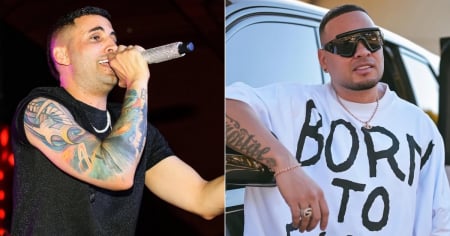The Cuban singer-songwriter Lenier Mesa recently shared in an interview for the program Un Martí To Durako, hosted by the anonymous character of the same name, one of the most tense experiences he had during his last trip to Cuba.
According to his account, the authorities of the country prohibited him from singing and imposed restrictions on him upon arriving on the island, where he had traveled to accompany the rapper Tekashi 6ix9ine.
Lenier recounted that upon landing in Cuba, he was held by the authorities and subjected to interrogation at the airport.
“The Cuban government did not allow me to sing in Cuba. When I got off the plane, they told me, ‘Stand right there, you cannot speak here, you cannot leave this room where you will be, you came to accompany Tekashi 69, you are not welcome in this country, you cannot sing here’,” he detailed during the interview.
The artist revealed that officials also accused him of disrespecting the Cuban president, which would have motivated the restrictions imposed against him.
These statements revealed the tension that exists between artists of the Cuban diaspora and the authorities of the regime, who have intensified control over public figures visiting the island.
Lenier Mesa's trip to Cuba alongside Tekashi 6ix9ine sparked a wave of comments on social media, both due to the presence of international figures on the island and the restrictions on artistic freedom faced by some musicians.
Although Lenier did not provide further details about the planned activities during his visit, he highlighted the discomfort of being unable to perform his job in his own country due to censorship.
With these revelations, Lenier Mesa joins the list of Cuban artists who have publicly denounced acts of repression and censorship by the Cuban government.
The singer, known for his successful musical repertoire, has been an advocate for the rights and freedoms of Cubans both on the island and abroad.
His testimony not only highlights the challenges faced by artists in Cuba but also reinforces the call for attention to the human rights situation in the country.
Meanwhile, Lenier continues his artistic career from exile, bringing his music to audiences around the world and raising his voice for a freer Cuba.
Frequently asked questions about the repression of artists in Cuba and the case of Lenier Mesa
Why was Lenier Mesa suppressed during his visit to Cuba?
Lenier Mesa was repressed by the Cuban government due to the statements he made against the Cuban president and for his association with the rapper Tekashi 6ix9ine. Upon arriving in Cuba, the authorities prohibited him from singing and kept him confined to a room, preventing him from performing his artistic work.
How does censorship affect Cuban artists in exile?
Censorship in Cuba limits the artistic freedom of Cuban musicians, especially those in exile. These artists face restrictions when attempting to return to the island, and their work is constantly monitored. The repression that Lenier Mesa experienced is an example of how the Cuban regime seeks to silence those who criticize the government from abroad.
What is Lenier Mesa's stance on the Cuban regime and the exile community in Miami?
Lenier Mesa has taken a critical stance towards the Cuban regime, although he has also expressed his disagreement with some influencers from the exile community in Miami who incite protests on the island. Mesa argues that it is important to advocate for truth and human rights, but he criticizes the hypocrisy of those who, from the comfort of abroad, call for action without understanding the reality of those living in Cuba.
What impact does repression have on Lenier Mesa's artistic career?
Despite the repression, Lenier Mesa continues his career from exile, using his music to raise his voice for a freer Cuba. Censorship has not stopped him from creating and collaborating with international artists, such as Tekashi 6ix9ine, expanding his audience and maintaining his commitment to the rights and freedoms of Cubans.
Filed under:
